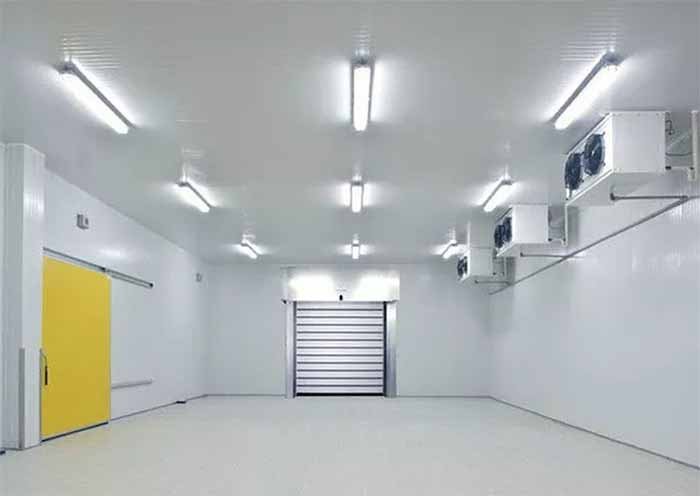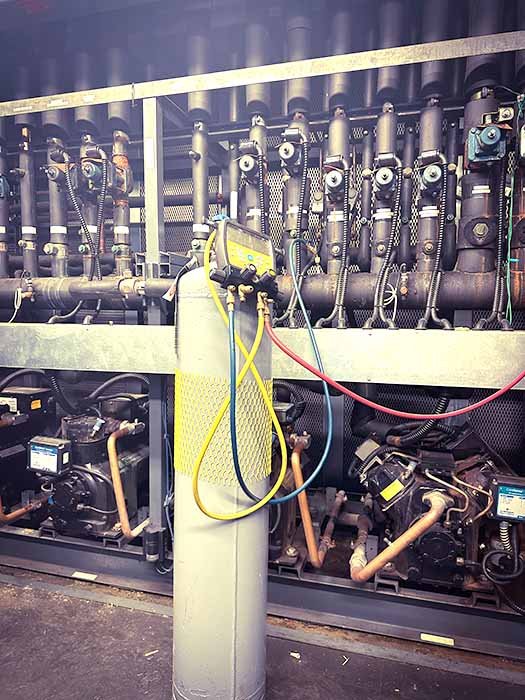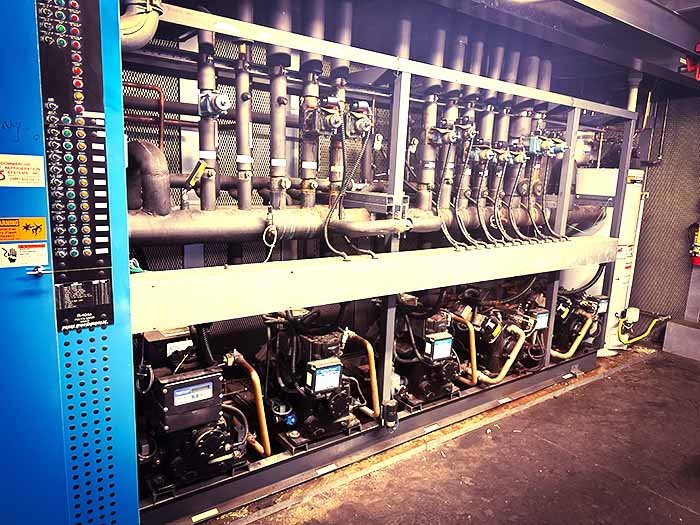Overview of Commercial Refrigeration: Introduction to the world of commercial refrigeration and its industry applications.
Types of Commercial Refrigeration Systems: Exploring various systems including walk-ins, display cases, and industrial chillers.
Refrigeration System Design Principles: Fundamentals of designing efficient and reliable commercial refrigeration systems.
Advanced Compressor Technology: In-depth study of compressors used in commercial settings, including screw and centrifugal types.
Evaporators in Commercial Systems: Understanding the design and functionality of evaporators in large-scale refrigeration.
Condenser Units for Commercial Use: Examining different types of condensers and their application in commercial refrigeration.
Commercial Refrigerants: Focus on refrigerants used in commercial applications, including natural and synthetic options.
Thermostatic Expansion Valves (TXVs): Detailed study of TXVs and their role in commercial refrigeration systems.
Pressure Controls and Monitoring: Learning about pressure control mechanisms and their importance in commercial refrigeration.
Electrical Systems in Commercial Refrigeration: Comprehensive look at the electrical components and wiring in commercial refrigeration systems.
Commercial Refrigeration Load Calculations: Methods for accurately determining the refrigeration load for commercial applications.
Refrigeration Cycle in Commercial Systems: In-depth exploration of the refrigeration cycle as it applies to commercial refrigeration.
Piping and Insulation: Best practices for piping and insulation in commercial refrigeration systems.
Defrosting Mechanisms: Understanding different defrosting methods used in commercial refrigeration.
Energy Efficiency in Commercial Refrigeration: Strategies for maximizing energy efficiency in commercial systems.
Maintenance of Commercial Refrigeration Systems: Routine and preventive maintenance practices for commercial refrigeration.
Troubleshooting Commercial Systems: Approaches to diagnosing and resolving issues in commercial refrigeration units.
Repair Techniques for Commercial Refrigeration: Advanced repair methods for commercial refrigeration systems.
Safety Protocols in Commercial Refrigeration: Emphasizing safety measures and protocols in the commercial refrigeration industry.
Control Systems and Automation: Studying automated control systems used in modern commercial refrigeration.
Commercial Refrigeration System Retrofitting: Retrofitting processes for updating and upgrading existing commercial systems.
Environmental Impact of Commercial Refrigeration: Discussion on the ecological footprint of commercial refrigeration and ways to minimize it.
Regulations and Compliance: Overview of regulations and compliance standards in commercial refrigeration.
Heat Rejection in Commercial Systems: Understanding heat rejection processes in large refrigeration systems.
Humidity Control in Commercial Refrigeration: Techniques for managing humidity levels in commercial refrigeration spaces.
Case Studies in Commercial Refrigeration: Analysis of real-world examples and case studies in commercial refrigeration.
Customer Service and Communication: Skills for effective customer service and communication in the commercial sector.
Commercial System Diagnostics: Using advanced diagnostics tools for commercial refrigeration systems.
Sound Management in Commercial Units: Addressing noise control in commercial refrigeration systems.
Commercial Refrigeration for Food Preservation: Specific requirements for food preservation in commercial refrigeration.
Industrial Ice Machines: Operation and maintenance of industrial-scale ice machines.
Blast Freezers and Chillers: Studying the operation and application of blast freezers and chillers.
Ammonia Refrigeration Systems: Specialized training on ammonia-based refrigeration systems, their properties, and safety measures.
CO2 Refrigeration Systems: Understanding the use and advantages of CO2 in commercial refrigeration.
Supermarket Refrigeration Systems: Specific needs and solutions for refrigeration in supermarket settings.
Transport Refrigeration: The intricacies of refrigeration systems used in transportation.
Cold Storage Warehousing: Principles and practices of managing large-scale cold storage facilities.
Refrigeration System Controls and Sensors: Deep dive into controls and sensors used for monitoring and managing commercial refrigeration.
Commercial System Efficiency Analysis: Methods for assessing and improving the efficiency of commercial refrigeration systems.
Emergency Services in Commercial Refrigeration: Training for responding to and managing emergency situations in commercial refrigeration.
Sustainability Practices in Commercial Refrigeration: Exploring sustainable practices and technologies in the commercial sector.
Quality Assurance in Commercial Refrigeration: Ensuring quality and reliability in commercial refrigeration services.
Project Management for Commercial Installations: Skills and strategies for effective project management in commercial refrigeration installations.
Advanced Refrigeration Technologies: Keeping up with the latest technological advancements in commercial refrigeration.
Financial Management for Refrigeration Projects: Understanding the financial aspects of managing commercial refrigeration projects.
Advanced Cold Chain Management: Delve into the complexities of cold chain management for commercial refrigeration. This includes logistics planning, temperature monitoring, and ensuring compliance with health and safety standards for perishable goods storage and transport.
Custom Refrigeration Solutions for Unique Applications: Tailoring refrigeration systems for specific commercial needs, such as specialized cold storage, wine cellars, or pharmaceutical refrigeration. Understand the unique challenges and solutions for these bespoke applications.
Emerging Trends in Commercial Refrigeration: Stay ahead in the industry by exploring emerging trends and innovations in commercial refrigeration, such as IoT integration, environmentally-friendly refrigerants, and AI-powered monitoring systems.
Energy Audits and Sustainability Reporting: Learn to conduct energy audits for commercial refrigeration systems, identify areas for energy savings, and prepare sustainability reports for businesses focusing on eco-friendly practices.
Workplace Health and Safety Standards: Comprehensive training on workplace health and safety specific to commercial refrigeration, including risk assessment, safe handling of refrigerants, and emergency response protocols.
Financial Incentives and Rebates for Energy-Efficient Systems: Understanding the financial incentives, including rebates and tax credits, available for businesses that invest in energy-efficient commercial refrigeration systems.
Building Client Relationships and Retention: Strategies for building long-term client relationships in the commercial refrigeration sector, focusing on customer service, follow-up practices, and managing client feedback effectively.
Refrigeration System Commissioning and Decommissioning: Detailed process of commissioning new refrigeration systems and decommissioning old ones, including environmental considerations for refrigerant recovery and system disposal.


